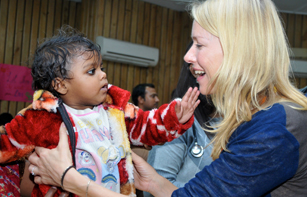
Feature Story
Ahead of World AIDS Day UNAIDS Goodwill Ambassador Naomi Watts meets with mothers living with HIV in India
28 November 2011
28 November 2011 28 November 2011
UNAIDS Goodwill Ambassador Naomi Watts during her visit to Safdarjung Hospital in New Delhi.
Ahead of this year’s World AIDS Day (1 December), UNAIDS Goodwill Ambassador Naomi Watts travelled to Safdarjung Hospital in New Delhi, India, to meet with mothers living with HIV and find out about some of the challenges they face in their daily lives.
Ms Watts toured the hospital and met with a group of mothers on the HIV ward. “I felt the many challenges they face, including the impact of stigma and shame, and yet it was their strength and determination to raise healthy children that shone through. We need to ensure that all mothers living with HIV get the services they and their families need. No mother needs to lose a child to AIDS and no child needs to be orphaned by AIDS.”
Safdarjung Hospital is a multi-specialty hospital in New Delhi and one of the largest government hospitals in India. The hospital provides medical care to people from across the country free of cost, including HIV prevention, treatment care and support services.
We need to ensure that all mothers living with HIV get the services they and their families need
UNAIDS Goodwill Ambassador Naomi Watts
During her visit, Ms Watts was greeted by staff of the hospital, who guided her through different HIV facilities that Safdarjung Hospital offers including preventing new infections in children. Ms Watts met with hospital staff and was able to get new insights into how HIV prevention programmes are run in India.
“We test over 400 men and women from across India per day,” said Dr Renu Arora, Head of the Preventing Parent to Child Transmission of HIV Centre at Safdarjung hospital. She highlighted, however, that about 15% of pregnant women living with HIV across India seek treatment too late in their pregnancies—immediately before or during labour—and that they give birth to about 50% of all HIV-positive children in the country.

Ms Watts spent time talking with women living with HIV, discussing the challenges they face including stigma.
Ms Watts spent time talking with women living with HIV, discussing the challenges they face including stigma. She learned that the virus just doesn’t impact the women but their communities and families as well––emotionally and financially. Stigma and discrimination create a silence that prevents women from coming forward to access vital HIV prevention information and services both in India and across the world.
Sukhhvinder Kaur said, “I was diagnosed with HIV while I was pregnant. My in-laws abandoned my baby and me and we now live with my parents without any financial support. If people had more awareness about HIV maybe my child and I would be accepted in society.”
There are an estimated 2.4 million people living with HIV in India, one of the countries with the highest numbers of people living with HIV globally.



